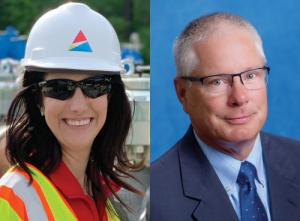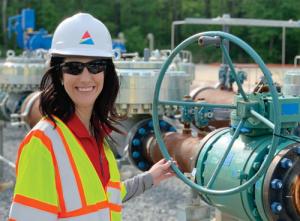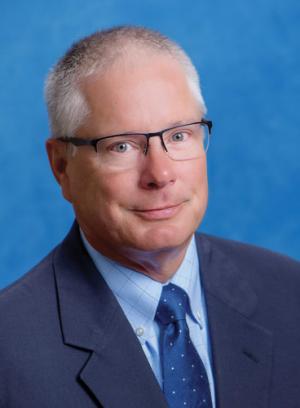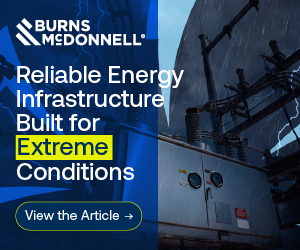Net Zero Emissions
Joanne Mello is the director for sustainability and energy policy at Southern Company Gas.
Richard Hyde is executive director at ONE Future.
In that famous scene in the sixties hit movie, The Graduate, the young man played by actor Dustin Hoffman is pulled aside at a party by a successful businessman, who then says a single word to him, plastics. Hoffman's character doesn't know what to make of this, when the businessman gives this advice, there's a great future in plastics. These lines are still funny, decades after the movie was first shown. Though, ironically, the plastics industry has indeed turned out to be one of the most transformational for society in those decades since then.

Which is why, if a movie studio did a remake of The Graduate this year, it might have the career advice to Hoffman be about, rather than plastics, decarbonizing gas. For, as the businessman might add, there's a great future in making natural gas sustainable. This field, the greening of gas, is evidently entering a period of enormous growth, in which innovation and investment in methane reduction all along the gas value chain, and in renewable substitutes like hydrogen, is increasing by leaps and bounds.
That's what Southern Company Gas is doing, itself and in concert with many other gas production, transmission and distribution companies, orchestrated by a new group called ONE Future. Check out its and our future by reading on. — Steve Mitnick
PUF's Steve Mitnick: Joanne, what is your role at Southern Company?
Joanne Mello: This is a relatively new role to our company. Southern Company Gas created a couple of new departments focused on climate strategy earlier this year. One of them was focused on sustainability and innovation, which is where I live and what I work on every day. We also have a new department focused on renewable gas strategy. It is an exciting time to be at the company.
 Joanne Mello: That has been a fantastic story about how our investments and those infrastructure improvements, and methane detection and reduction, has led to environmental benefits.
Joanne Mello: That has been a fantastic story about how our investments and those infrastructure improvements, and methane detection and reduction, has led to environmental benefits.
I'm responsible for helping coordinate the portfolio of sustainability strategy initiatives for our natural gas business. That is focused on efforts to reduce methane and carbon emissions through our policies, strategies, and technologies. It supports policy outreach and communications efforts on climate and sustainability matters.
I'm proud to speak of the work we've done with ONE Future but am standing with a team of folks here at Southern Company Gas, who have supported those efforts.
PUF: Richard, what is your role at ONE Future?
Richard Hyde: I'm the executive director for ONE Future, though I do this part time. I retired from Southern Company about two and a half years ago. I'm the executive director of thirty-four member companies. We're helping the membership drive toward reducing their methane emissions and working with them to be successful in doing that. ONE Future is a member-driven organization. We're not like a trade association. From a staffing level, we're lean.
 Richard Hyde: We’re going to see, in the next year or two, more companies either join ONE Future, or maybe even join in one of these programs that are looking at reducing methane emissions.
Richard Hyde: We’re going to see, in the next year or two, more companies either join ONE Future, or maybe even join in one of these programs that are looking at reducing methane emissions.
Everything is driven by the member companies like Southern Company Gas, to help us be successful. It's making the industry successful, and ensuring that natural gas is sustainable, even as we move toward a net-zero or a low carbon economy.
PUF: Why is that important?
Richard Hyde: We began ONE Future in 2014. One of the key drivers was ensuring that natural gas is sustainable, as we transition into a lower or a net-zero carbon economy. Natural gas has emissions. That's one of the key things we need to ensure, as an industry, that we drive down our methane emissions to as low a level as we possibly can.
There were some studies done back in the 2012, 2013 timeframe that looked at the competitiveness of natural gas compared to other fossil fuels, such as coal and oil as the primary examples. There's a concept called methane intensity. Methane emissions intensity is a measure of methane emissions relative to natural gas throughput.
It also could be viewed as your methane efficiency. How well do you handle a molecule of gas as it flows through your system? Do you keep it in the pipe or not? How well do you keep it in the pipe? We viewed that as something important in ensuring the same sustainability.
These studies I mentioned, said in order for natural gas to be competitive against all fossil fuels, whether it's power generation, transportation, or something else, that's needed to have a methane intensity level of one percent or less.
That's where we set our goal. We're trying to drive down our methane intensity levels as far below that as we possibly can. Companies like Southern Company Gas are doing a great job in helping us achieve that industry wide
PUF: How do you reduce methane intensity?
Joanne Mello: The great thing about ONE Future is that it's this concept of being the entire natural gas supply chain, production to consumption. We sit on the distribution side of that supply chain.
We have our distribution companies in four states. Where we have found success in terms of minimizing our methane emissions has been around the investments that we have made over time in modernizing our pipelines and infrastructure.
Within a twenty-year timeframe, from 1998 to 2018, we've invested more than 2.2 billion dollars in pipeline and infrastructure replacement. Those efforts have been focused on safety and operational improvements, but those efforts have also had environmental benefits. We've essentially reduced our annual methane emissions by fifty percent over that timeframe. At the same time, we accommodated a twenty percent growth in our system.
That has been a fantastic story about how our investments and those infrastructure improvements, and methane detection and reduction, has led to environmental benefits. Our distribution system now operates at almost 99.9 percent efficiency in its delivery of natural gas, sticking to that intensity concept that Richard did a great job of explaining.
PUF: What other companies are there, besides Southern Company Gas?
Richard Hyde: We cover the entire natural gas value chain. We have companies that are production companies. We have companies from the wellhead, the production side, all the way through midstream, and distribution.
We have companies such as Apache, and Dominion, all the way down to Southern Company Gas, National Grid, and Consolidated Edison on the distribution side.
There are a lot of organizations that are looking at and working on reducing methane emissions, and they're all doing great work. One of the unique things about ONE Future is we look at this as a value chain approach.
It's not necessarily one particular sector's issue, it's a natural gas industry issue. That's the mantra and the mindset we have as we look at driving down these emissions. It's looking at it all the way through, from wellhead to burner tip.
PUF: It sounds like a lot of these production companies are on board and they're trying to make these improvements too.
Richard Hyde: Yes. From a ONE Future perspective, and the membership we have, that is right. We try to hold each other accountable. It's helpful. The fact that we set up goals we're trying to reach also holds us accountable. The approach we have undertaken is unique to a lot of the other efforts that are underway.
PUF: Tell us about how this figures into overall energy policy, the importance of natural gas, and trying to make natural gas sustainable.
Joanne Mello: From our perspective, everyone deserves energy that is not only clean, but safe, reliable, and affordable. Those are the tenets that Southern Company, and Southern Company Gas, stand by.
We believe the best approach to achieving that is an all of the above energy strategy that capitalizes on the unique benefits that gas, renewables, nuclear power, negative carbon, each respectively provides, and use them at the appropriate time.
Natural gas is a critical part. We have done so much as an industry to contribute to the reduction of carbon dioxide emissions to this point, and we believe it's going to be a critical partner in the growth of renewables and in the achievement of clean energy goals.
From a policy perspective, we're committed to doing our part to achieve the goals we've outlined as a company. We believe our success is going to depend on the intersection of all the policies at the federal and state levels, and working with our stakeholders, our customers, and policymakers to find a pathway that best provides for our customers in the communities we serve.
It's always keeping our customers at the center of everything that we do. We as an organization are structured to support that. That is important to make sure we're keeping those all aligned.
PUF: Looking forward, how much more can you do, say three, five years out?
Joanne Mello: Southern Company Gas is part of Southern Company's broader corporate goal of getting to net zero by 2050. We're going to continue to do what we can to continue to reduce the emissions from our business.
We're also looking at opportunities around things like renewable natural gas, and beyond that net zero goal, looking at improving the sustainability of our system and across the value chain for things like how we source our gas.
We think about the members of ONE Future. That value chain effort is helpful for us as we think about gas supply and trying to purchase our gas in a more sustainable manner. We did a transaction at our subsidiary Virginia Natural Gas last year focused on sourcing gas from select, low fugitive emission wells operated by gas producers in the ONE Future program, and we are looking to expand opportunities to source our gas from those types of companies where possible.
We're thinking about things like empowering our customers to reduce their environmental impact. That is programs for our customers to reduce their emissions. It's R&D and innovation, thinking about the future; how do we invest today to have the technologies we need for the future to get us to the more difficult, last bit of that goal as we get out to 2050.
PUF: I guess some of those best practice companies are in your group.
Richard Hyde: Yes. If you look at the membership of ONE Future, across the board, it's a progressive company. Take Southern Company as a whole, not necessarily just Southern Company Gas.
They are a shining example of how any company is looking at all types of energy sources to bring to the market. They're a founding member of ONE Future. Southern Company Gas was there at the very beginning when ONE Future was created.
The companies that founded ONE Future, and the companies that have joined ONE Future since then are progressive. We're going to see, in the next year or two, more companies either join ONE Future, or maybe even join in one of these programs that are looking at reducing methane emissions.
Everybody is beginning to understand, we've got to do this. We can't go the way of coal. We have to be proactive, get after it, and do the work necessary to ensure that we are around fifty years from now.



